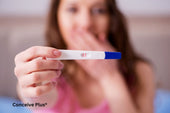How Much Sperm Does It Take to Get Pregnant?

If you’ve ever wondered how much sperm does it take to get pregnant, you’re not alone. It’s one of the most common questions for couples trying to conceive. The truth is, while it only takes one sperm to fertilize an egg, the entire process is a lot more complex than it might seem at first. It involves millions of sperm, specific timing, and optimal conditions for everything to align perfectly [1].
Understanding how much semen does it take to get pregnant is important for those planning to expand their family. Fertility isn’t just about the quantity of sperm; it’s also about quality. Here, we’ll explore all the factors that play a role, like sperm health, semen volume, and tips for getting pregnant to improve your chances of conception.
Key Takeaways
- How much sperm does it take to get pregnant? Just one, but millions are needed to improve the odds.
- Healthy sperm count is at least 15 million sperm per milliliter of semen [2].
- Quality matters—sperm need to be motile and have the right shape to reach and fertilize the egg [3].
- Timing is critical; the fertile window is the best time for conception [4].
- Small lifestyle changes, like eating healthier and exercising, can boost sperm health.
- Reducing stress and avoiding smoking, alcohol, and toxins improves fertility in both men and women [5].
- Professional help can be vital if conception doesn’t happen after a year of trying.
How Many Drops of Sperm Is Needed to Get Pregnant
Here’s the thing. Technically speaking, how many drops of sperm is needed to get pregnant depends on what’s inside those drops. Even a tiny amount of semen can have millions of sperm, but not all of them are viable or healthy enough to make the journey to the egg.
Most sperm won’t survive the acidic environment of the vagina, and many others will fail to reach the egg in the fallopian tube [6]. This is why having a good sperm count is essential. The World Health Organization defines a normal sperm count as at least 15 million sperm per milliliter of semen.
Even if there are fewer sperm, it’s still possible to conceive—it might just take a bit longer. But the journey each sperm takes is no joke. It’s like a marathon where only one gets to win.
How Much Sperm Is Needed to Get Pregnant
So, how much sperm is needed to get pregnant? Ideally, you want millions of healthy sperm in a single ejaculation. But here’s the kicker: out of all those millions, only one sperm will successfully fertilize the egg. It’s a numbers game, really.
Sperm quality matters just as much as quantity. The sperm needs to be motile (able to swim effectively) and have a healthy shape. Morphology, or the structure of the sperm, plays a big role in determining whether it can penetrate the egg.
Healthy sperm are shaped with oval heads and long tails that propel them forward. Misshapen sperm, or ones that can’t move properly, are less likely to fertilize an egg, which is why boosting overall sperm health is so important [7].
How Much Cum Is Needed to Get Pregnant
When thinking about how much cum is needed to get pregnant, remember that the amount of semen doesn’t always equal a higher chance of pregnancy each month. A healthy ejaculation usually measures between 1.5 and 5 milliliters, which is roughly a teaspoon.
But the real question is: What’s in that teaspoon? If the semen contains a high concentration of motile sperm, even a small amount could result in conception. On the other hand, large amounts of semen with low sperm counts or poor motility may not be effective [8].
How Much Sperm Do You Need to Get Pregnant
Wondering how much sperm do you need to get pregnant? Well, the answer is—just one. However, the journey is tough, and only a few sperm out of millions make it to the egg.
In an average ejaculation, men release millions of sperm, but only about 100 to 200 of them actually reach the fallopian tube. From there, it’s a race to the egg. Timing intercourse during the fertile window (about 5 days leading to ovulation) makes a huge difference in helping sperm meet the egg.
How Much Cum Does It Take to Get Pregnant
There’s often confusion about how much cum does it take to get pregnant, but the amount of ejaculate matters less than its quality. Semen acts as the medium for sperm, but its composition, including nutrients and pH levels, plays a significant role in keeping sperm alive and motile [9].
If you’re trying to conceive, focusing on lifestyle changes like a healthier diet, regular exercise, and staying hydrated can improve semen quality and sperm health. These changes can enhance the chances of conception, even if the volume of ejaculate remains the same.
How Much Sperm Need to Get Pregnant
It’s a common myth that the more sperm, the better, but how much sperm need to get pregnant isn’t just about numbers. A high sperm count is helpful, but if those sperm aren’t healthy or motile, the chances of fertilization drop.
Doctors recommend a semen analysis to evaluate sperm count, motility, and morphology. These factors together determine the likelihood of conception. If there are issues, simple lifestyle changes or supplements containing antioxidants like CoQ10 and L-carnitine can help [10].
How Much of Sperm Is Required to Get Pregnant
People often ask how much of sperm is required to get pregnant and the answer depends on the health of the sperm. A concentration of at least 15 million sperm per milliliter is considered normal. Anything below this may reduce fertility, though pregnancy is still possible.
Healthy sperm are critical because they need to swim through the female reproductive tract, which is a challenging environment. Once they reach the fallopian tube, the sperm must penetrate the egg’s outer layer to fertilize it.
How Much Sperm Required to Get Pregnant
The question how much sperm required to get pregnant ties directly to sperm health. Besides count, factors like motility (movement) and morphology (shape) are just as important. Even if a man has millions of sperm, issues with motility or abnormal shapes can reduce the chances of conception.
Doctors often recommend a semen analysis if there are concerns about fertility. This test can identify issues and guide the next steps for improving sperm health through diet, exercise, and possibly supplements.
How Does a Man Get a Woman Pregnant
To understand how does a man get a woman pregnant, it helps to break down the process. During intercourse, sperm are ejaculated into the vagina. From there, they travel through the cervix and uterus to reach the fallopian tube, where an egg waits to be fertilized [11].
This journey is aided by cervical mucus, which becomes more sperm-friendly during ovulation. Timing sex around this fertile window significantly boosts the chances of conception.
How Much Sperm Has to Go In to Get Pregnant
As for how much sperm has to go in to get pregnant, it’s not about the depth but the quality of the sperm and the timing of intercourse. Sperm are strong swimmers and can reach the egg even if deposited near the vaginal entrance.
Once inside, sperm rely on chemical signals to guide them toward the egg. It’s a challenging journey, but healthy, motile sperm have a better chance of success [12].
The Role of Sperm in Pregnancy
The relationship between sperm in pregnancy and sperm and pregnancy is undeniable. Sperm health determines whether fertilization can occur. The quality of the sperm affects not only the chances of conception but also the health of the pregnancy itself.
For men, focusing on their overall health and avoiding harmful habits like smoking, excessive alcohol consumption, and exposure to toxins can significantly improve sperm quality [13].
Sperm for Pregnancy
When considering sperm for pregnancy, it’s clear that the health and functionality of the sperm are more important than just the quantity. Taking care of reproductive health through proper nutrition, regular exercise, and stress management can make a difference in achieving a successful pregnancy.
The Bottom Line
So, how much sperm does it take to get pregnant? It’s really about quality and timing as much as quantity. While one sperm fertilizes the egg, millions are needed to make the journey possible. Most sperm don’t survive the trip to the egg—it’s a tough environment!
Healthy sperm are the key to making it work. Focusing on things like better nutrition, staying active, and avoiding harmful habits can improve fertility naturally. And yeah, the timing matters a lot. Hitting the fertile window boosts your chances big time.
If things don’t work out right away, it’s okay to seek help. Sometimes just understanding the root cause can make all the difference. Fertility isn’t just one person’s responsibility—it’s a team effort. With some patience and the right approach, parenthood could be closer than you think.
By understanding how much sperm does it take to get pregnant and addressing factors that affect fertility, couples can increase their chances of conceiving and starting their journey toward parenthood.
FAQs
How much sperm does it take to get pregnant?
It takes only one sperm to fertilize an egg, but millions are needed to increase the odds of conception.
How much semen does it take to get pregnant?
A healthy semen sample contains at least 15 million sperm per milliliter, which is optimal for pregnancy.
Can a man with a low sperm count still get a woman pregnant?
Yes, it’s possible, but it may take longer or require medical assistance.
What lifestyle changes can improve sperm quality?
Eating a healthy diet, exercising regularly, managing stress, and avoiding smoking and alcohol can help.
How can you test sperm health?
A semen analysis measures sperm count, motility, and morphology to assess fertility.
Citations
- Evenson, D. P., & Wixon, R. (2006). Clinical aspects of sperm DNA fragmentation detection and male infertility. Theriogenology. Available at: https://pubmed.ncbi.nlm.nih.gov/16242181/
- Cao, X. W., Lin, K., Li, C. Y., & Yuan, C. W. (2011). Zhonghua nan ke xue = National journal of andrology. Available at: https://pubmed.ncbi.nlm.nih.gov/22235670/
- Amann, R. P., & Hammerstedt, R. H. (1993). In vitro evaluation of sperm quality: an opinion. Journal of andrology. Available at: https://pubmed.ncbi.nlm.nih.gov/8294222/
- Wilcox, A. J., Weinberg, C. R., & Baird, D. D. (1995). Timing of sexual intercourse in relation to ovulation. Effects on the probability of conception, survival of the pregnancy, and sex of the baby. The New England journal of medicine. Available at: https://pubmed.ncbi.nlm.nih.gov/7477165/
- Agarwal, A., Mulgund, A., Hamada, A., & Chyatte, M. R. (2015). A unique view on male infertility around the globe. Reproductive biology and endocrinology. Available at: https://pubmed.ncbi.nlm.nih.gov/25928197/
- Björndahl, L., & Kvist, U. (1990). Influence of seminal vesicular fluid on the zinc content of human sperm chromatin. International journal of andrology. Available at: https://pubmed.ncbi.nlm.nih.gov/2387643/
- de Kretser D. M. (1997). Male infertility. Lancet (London, England). Available at: https://pubmed.ncbi.nlm.nih.gov/9074589/
- Krause W. (1995). Computer-assisted semen analysis systems: comparison with routine evaluation and prognostic value in male fertility and assisted reproduction. Human reproduction (Oxford, England). Available at: https://pubmed.ncbi.nlm.nih.gov/8592042/
- Zini, A., & Al-Hathal, N. (2011). Antioxidant therapy in male infertility: fact or fiction?. Asian journal of andrology. Available at: https://pubmed.ncbi.nlm.nih.gov/21516118/
- Sikka, S. C., & Wang, R. (2008). Endocrine disruptors and estrogenic effects on male reproductive axis. Asian journal of andrology. Available at: https://pubmed.ncbi.nlm.nih.gov/18087652/
- Jarvis G. E. (2016). Early embryo mortality in natural human reproduction: What the data say. F1000Research. Available at: https://pmc.ncbi.nlm.nih.gov/articles/PMC5443340/
- Eisenbach, M., & Giojalas, L. C. (2006). Sperm guidance in mammals - an unpaved road to the egg. Nature reviews. Molecular cell biology. Available at: https://pubmed.ncbi.nlm.nih.gov/16607290/
- Sharma, R., Biedenharn, K. R., Fedor, J. M., & Agarwal, A. (2013). Lifestyle factors and reproductive health: taking control of your fertility. Reproductive biology and endocrinology. Available at: https://pubmed.ncbi.nlm.nih.gov/23870423/



















